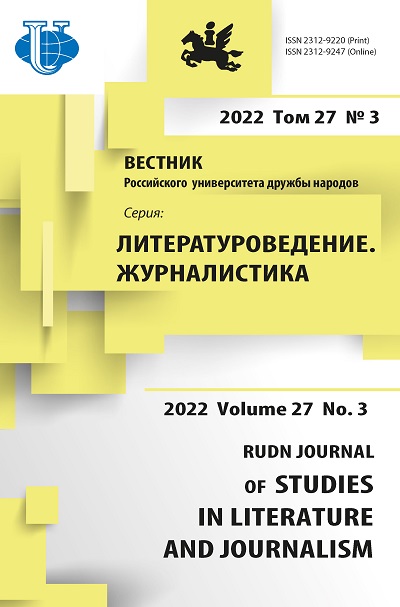Литература русофонии
- Авторы: Нефёдова Н.И.1
-
Учреждения:
- Московский государственный университет имени М.В. Ломоносова
- Выпуск: Том 27, № 3 (2022)
- Страницы: 468-476
- Раздел: Литературоведение
- URL: https://journals.rudn.ru/literary-criticism/article/view/32299
- DOI: https://doi.org/10.22363/2312-9220-2022-27-3-468-476
- ID: 32299
Цитировать
Полный текст
Аннотация
В некоторых исследованиях конца XX - начала XXI в. по отношению к художественной литературе, созданной на русском языке, наряду с понятиями «русская литература» или «русскоязычная литература» можно увидеть другой термин: «литература русофонии». В исследовании предпринята попытка рассмотреть различные варианты понимания исследователями слова «русофония», изучить взгляды ученых на пространственные и временные границы этого явления. Кроме того, представлены и проанализированы различные классификации, позволяющие определить корпус текстов, которые можно отнести к литературе русофонии, и место этой литературы в современном литературном процессе. На основе изучения посвященных данной теме работ, как отечественных, так и зарубежных ученых, сделаны выводы о том, что зарождение русофонии относят к периоду колониальной экспансии Российской империи в Центральную Азию и на Кавказ. Развитие национальных литератур и идеология дружбы народов во времена СССР, распад Советского Союза (когда жители одного государства стали гражданами разных стран) способствовали развитию и широкому распространению русофонии. Территориальные границы этого явления, а также литературы русофонии не ограничиваются географическими границами тех или иных государств. Более того, можно предположить, что словосочетание «литература русофонии» весьма синонимично выражению «русскоязычная литература». Однако по отношению к современной русскоязычной литературе наиболее удобным и обоснованным является употребление выражения «литература русофонии», так как этот термин, как отмечают некоторые исследователи, не является этнически, политически и географически привязанным, более нейтрален, благозвучен (например, при переводе на английский язык).
Об авторах
Надежда Ивановна Нефёдова
Московский государственный университет имени М.В. Ломоносова
Автор, ответственный за переписку.
Email: nefyodova.ni@gmail.com
ORCID iD: 0000-0003-3102-1026
аспирант, кафедра истории новейшей русской литературы и современного литературного процесса
Российская Федерация, 119991, Москва, Ленинские горы, д. 1, стр. 51Список литературы
- Лейдерман Н.Л. Русскоязычная литература - перекресток культур // Филологический класс. 2015. № 3 (41). С. 19-24.
- Новиков В.И. Русофония // Синтаксис. 1991. № 31. С. 5.
- Новиков В.И. Сорок два свидания с русской речью // ЛитМир: электронная библиотека. 2007. URL: https://www.litmir.me/bd/?b=175865 (дата обращения: 21.12.2020).
- Овчеренко У. Современная проза Казахстана на русском языке: основные тенденции развития: дис. … канд. фил. наук. М.: Московский государственный университет, 2021.
- Рудяков А.Н. Русофония и русистика в XXI веке // Культура народов Причерноморья. 2007. Т. 1. № 110. С. 7-9.
- Соколова Е.О. Движение «Русофонии» как новый тренд в формировании внешней политики Российской Федерации // Азимут научных исследований: экономика и управление. 2017. № 4 (21). С. 362.
- Шульженко В.И. Современная литература на русском языке в контексте традиций отечественной классики и межкультурной интеграции в XXI веке // Мир русского слова. 2018. № 4. С. 79-87. http://doi.org/10.24411/1811-1629-2018-14079
- Caffee N.B. Russophonia: towards a transnational conception of Russian-Language literature. eScholarship University of California, 2013. URL: https://escholarship.org/uc/item/3z86s82v (дата обращения: 30.12.2020).
Дополнительные файлы















